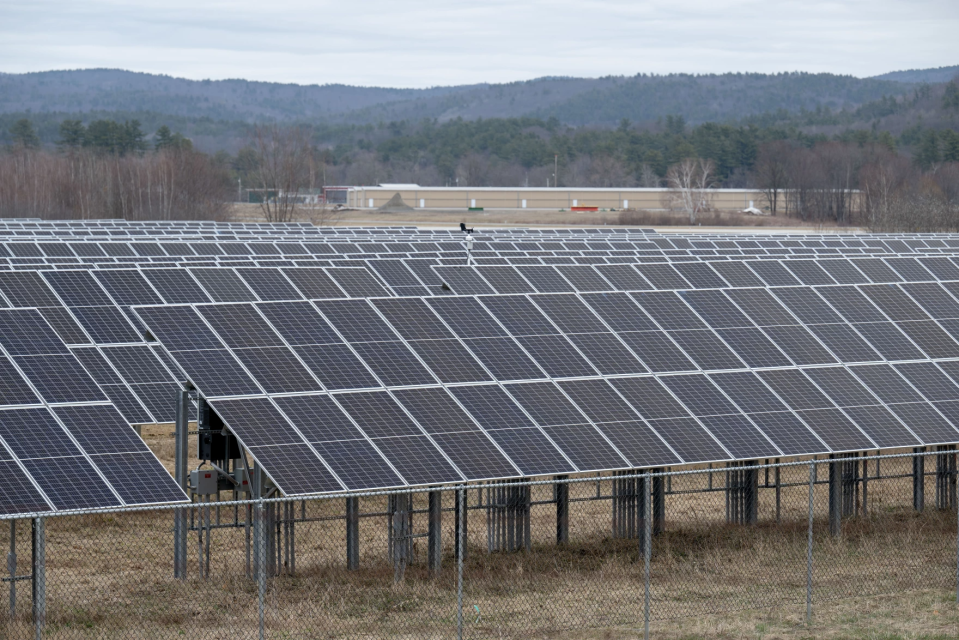How New Hampshire is helping small towns go solar with federal funds
New Hampshire’s energy department is preparing to road-test a grant program meant to help disadvantaged cities and towns access the environmental and financial benefits of solar power.
The state plans to use $1.4 million from the 2021 federal Bipartisan Infrastructure Act to help fund the installation of solar projects up to 60 kilowatts on municipal buildings or land. The grant will cover up to 95 percent of the costs of a qualifying solar project for lower-income cities and towns and 60 percent for other municipalities.

In addition to cutting carbon emissions, solar can also make a community more resilient in case of power outages. Using it to power municipal facilities can save money that can be reinvested in public projects or used to hold down property tax rates in the long term.
The funding application has been submitted to the U.S. Department of Energy, and New Hampshire is now in “wait-and-see mode,” said Joshua Elliott, director of policy and programs in the state energy department.
The state is also looking at the program as something of a trial run, to see if it makes sense to continue and expand the grant offering in the future.
“We’re looking at this program as almost the guinea pig to see what demand is out there, what can we do, what we can improve,” Elliott said. “Then we’ll use this process to inform what potentially a [larger] municipal program could look like.”
New Hampshire lags in solar adoption
As a whole, New Hampshire lags behind the region in solar adoption. The state ranks 41st in the country for installed solar capacity, behind even lower-population New England states like Maine, Rhode Island, and Vermont, according to the Solar Energy Industry Association. State policies to encourage solar are limited, with incentives for residential solar maxing out at $1,000 per project and rebates for commercial solar limited to $10,000.
On the municipal level, though, many New Hampshire cities and towns are very interested in solar power. For example, in Hanover, a more affluent town and the home of Dartmouth College, solar arrays provide nearly all the power used by municipal facilities. Smaller towns and those with lower average incomes, however, often have a harder time realizing their solar goals.
New Hampshire property owners already have one of the highest property tax burdens in the country, so proposing that the residents of small, disadvantaged towns pay more to install solar is a big ask, even if there could be financial benefits down the line. Beyond the issue of funding, there are the logistics: researching options, hiring consultants, and assessing different grant options.
“If you have the idea that you want solar on the town hall, you have to go from the idea to the implementation,” said Margaret Byrnes, executive director of the New Hampshire Municipal Association. “For municipalities that don’t have that internal staff, it’s a significant lift.”
The grant program aims to lighten that burden. And to maximize the benefits these towns can achieve, the grant guidelines encourage municipalities to skip entering into leasing arrangements and instead buy their solar arrays outright, so they retain the rights to sell renewable energy credits.
“We want all of those benefits flowing to the community itself,” Elliott said.
Small towns eager for solar grants
Colebrook, a town of roughly 2,000 people just 10 miles south of the Canadian border, is looking at the grant program as a potential way to fund a solar array on the roof of its town hall. Tourism is the main economic driver in the remote and scenic town, and there is little industry and few high-paying jobs. The median household income in the town is just over $48,000, well below the state median of $91,000.
“We can’t just go out and ask for $150,000 from the town to foot the bill” for a solar project, said Colebrook Town Manager Tim Stevens. “Any time you have to go back to the town and ask for more money than you did before, that has a negative impact on them.”
Hinsdale, a small town near the state’s southern border, has plans to open its transfer station full-time and hopes to build a solar array on the site to help power the operation. A recent report, however, found that most residents’ property taxes had increased between 25 percent and 48 percent between 2018 and 2022, making it challenging to ask for yet more money. And there’s a bridge in town that needs to be rebuilt and other pressing infrastructure issues.
“Unfortunately, solar is not on that priority list,” said Josh Green, Hinsdale’s community development coordinator.
He estimates that a 60-kilowatt array at the transfer station would cost about $260,000. With the grant, the town would have to pay only about $13,000 of that total tab.
“The solar grant would definitely help the town out tremendously,” Green said.
Though the planned grant program is modest in size – the total budget will likely be able to fund only a handful of projects – it is well-tailored to the needs of the state, said Melissa Elander of Clean Energy New Hampshire, a nonprofit advocacy group that has been working with municipalities in the northern part of the state to prepare for the launch of the grants.
“It’s a good fit to focus on smaller towns that often get forgotten in some of the larger grant programs,” she said. “I am thrilled that it’s going to be available at all.”
This article first appeared on Energy News Network and is republished here under a Creative Commons license.
This story was originally published by the New Hampshire Bulletin
This article originally appeared on Portsmouth Herald: New Hampshire launches solar grant program for less affluent towns

